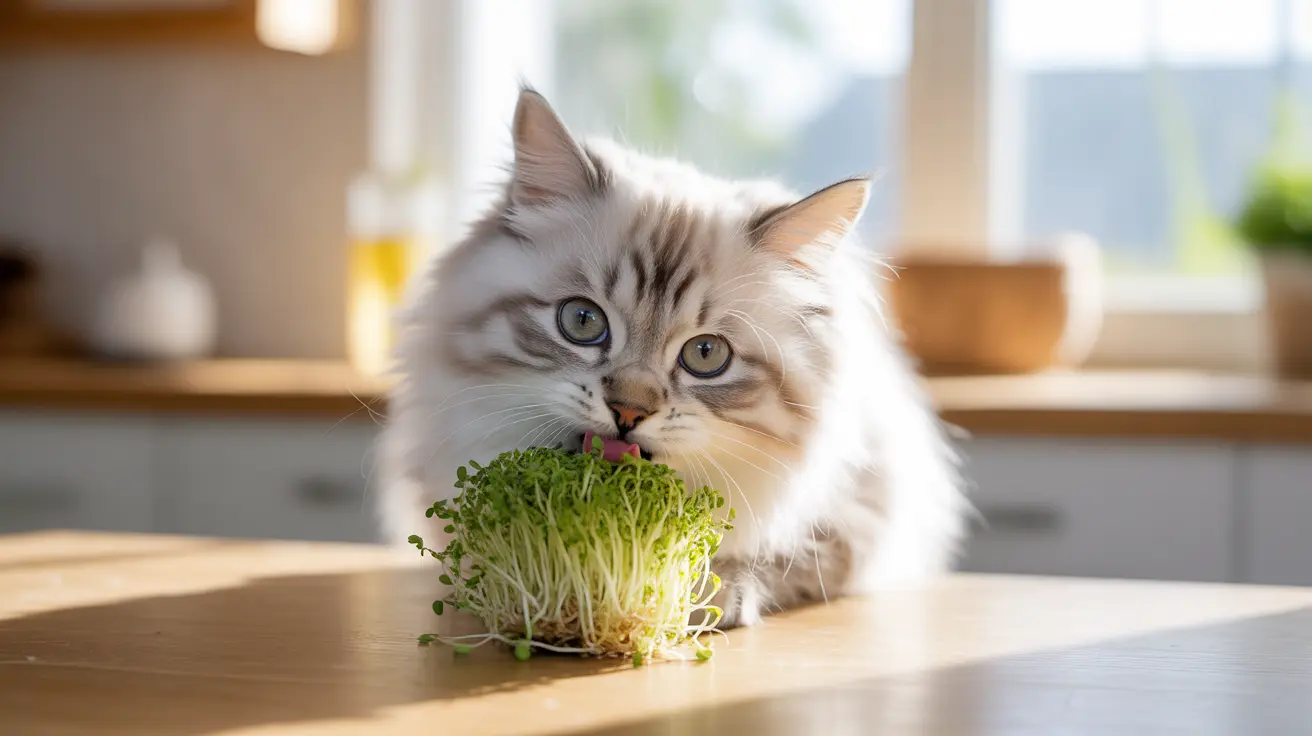Introduction
If you're wondering whether cats can eat alfalfa sprouts, you're not alone. As more pet owners embrace natural and varied diets for their feline friends, questions about safe plant-based additions to their diet have become increasingly common. While cats are obligate carnivores, meaning they require meat-based proteins to thrive, certain plant foods can be offered as occasional treats – but where do alfalfa sprouts fit in this picture?
Let's explore the complete safety profile, potential benefits, and important considerations when it comes to feeding alfalfa sprouts to your feline companion.
Safety of Alfalfa Sprouts for Cats
The good news is that alfalfa sprouts are not toxic to cats. However, this doesn't automatically make them an ideal food choice. While technically safe, these sprouts should only be offered in very small quantities and on an occasional basis to healthy adult cats.
It's crucial to understand that cats' digestive systems are specifically designed to process animal proteins, not plant materials. While they might nibble on plants occasionally, their bodies aren't optimized to derive significant nutritional value from plant sources.
Nutritional Benefits and Limitations
Alfalfa sprouts contain various nutrients including vitamins A, C, and K, along with minerals like calcium and iron. However, cats already receive these nutrients from their regular cat food, making alfalfa sprouts unnecessary from a nutritional standpoint.
The fiber content in alfalfa sprouts might help with occasional mild constipation or hairball issues, but there are more appropriate solutions specifically designed for these feline health concerns.
Potential Risks and Concerns
Digestive Issues
Feeding too many alfalfa sprouts can lead to digestive upset in cats, including:
- Vomiting
- Diarrhea
- Stomach discomfort
- Gas
Food Safety Risks
Raw sprouts can harbor harmful bacteria like E. coli and Salmonella. This risk is particularly concerning for cats with compromised immune systems, making proper washing and storage crucial if you choose to offer these treats.
Guidelines for Feeding Alfalfa Sprouts to Cats
If you decide to offer alfalfa sprouts to your cat, follow these important guidelines:
- Wash sprouts thoroughly before serving
- Offer only a few strands (about the size of your fingernail)
- Monitor your cat for any adverse reactions
- Store sprouts properly in the refrigerator
- Never force your cat to eat them
Better Alternatives for Cats
Instead of alfalfa sprouts, consider these safer alternatives for cats who enjoy nibbling on greens:
- Cat grass (specifically grown for felines)
- Wheatgrass
- Commercial cat treats designed for digestive health
- Vet-approved dietary supplements
Frequently Asked Questions
Can cats safely eat alfalfa sprouts, and how much is okay?
Yes, cats can safely eat alfalfa sprouts in very small amounts (a few strands), but only as an occasional treat. They should not be a regular part of your cat's diet.
What are the nutritional benefits of alfalfa sprouts for cats?
While alfalfa sprouts contain vitamins and minerals, cats derive minimal nutritional benefit from them as they're designed to process nutrients from animal sources.
Are alfalfa sprouts suitable for kittens or only adult cats?
Alfalfa sprouts are not recommended for kittens due to their sensitive digestive systems and higher risk of foodborne illness. Only healthy adult cats should be offered these treats.
What possible digestive problems can alfalfa sprouts cause in cats?
Overconsumption of alfalfa sprouts can cause vomiting, diarrhea, stomach upset, and gas. Some cats may also experience allergic reactions.
How should I prepare and feed alfalfa sprouts to my cat to avoid health risks?
Thoroughly wash the sprouts, offer only a few strands at a time, and monitor your cat for any adverse reactions. Store sprouts properly in the refrigerator and discard any that show signs of spoilage.
Conclusion
While cats can eat alfalfa sprouts in moderation, they're not a necessary addition to their diet. If you choose to offer them as treats, do so sparingly and with proper precautions. Always prioritize your cat's primary nutritional needs through a balanced, meat-based diet, and consult with your veterinarian before introducing any new foods to their diet.






